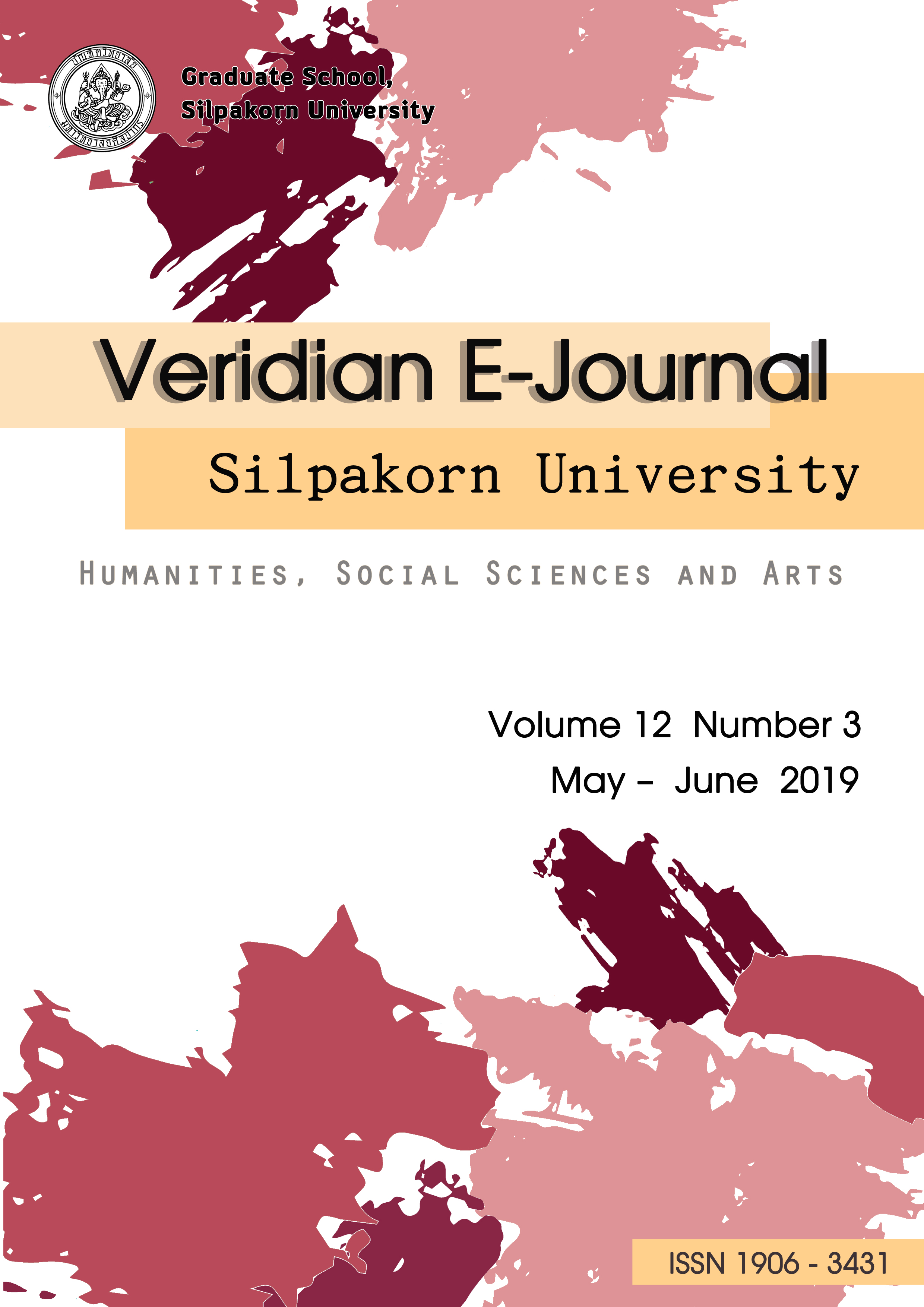อิทธิพลของความต้องการให้ตนเองดูดีทางสังคมและความต้องการทำธุรกรรมเชิงพาณิชย์ต่อความตั้งใจในการแบ่งปันข้อมูลและซื้อสินค้าออนไลน์ผ่านแพลตฟอร์มโซเชียลคอมเมิร์ซของผู้บริโภคกลุ่มเจเนอเรชั่นวาย (Influences of Social Desire and Commercial Desire on Sharing and Online Purchase Intention through Social Commerce Platform of the Generation Y Consumer)
Main Article Content
Abstract
การวิจัยครั้งนี้มีวัตถุประสงค์เพื่อศึกษาถึงอิทธิพลของความต้องการให้ตนเองดูดีทางสังคมและความต้องการทำธุรกรรมเชิงพาณิชย์ต่อความตั้งใจในการแบ่งปันข้อมูลและซื้อสินค้าออนไลน์ผ่านแพลตฟอร์มโซเชียลคอมเมิร์ซของผู้บริโภคกลุ่มเจเนอเรชั่นวาย เครื่องมือที่ใช้ในงานวิจัยคือแบบสอบถามซึ่งพัฒนามาจากการทบทวนวรรณกรรม และการตรวจสอบความเที่ยง โดยการทดสอบค่าสัมประสิทธิ์อัลฟ่าครอนบาค แบบสอบถามได้กระจายต่อแก่กลุ่มตัวอย่างซึ่งเป็นผู้บริโภคกลุ่มเจเนอเรชั่นวายที่มีประสบการณ์ในการซื้อสินค้าออนไลน์ผ่านทางเว็บไซต์โซเชียลคอมเมิร์ซ จำนวน 330 คน โดยใช้วิธีสุ่มตัวอย่างแบบสะดวก จากนั้นทำการวิเคราะห์โมเดลการวัดและวิเคราะห์โมเดลสมการโครงสร้างก่อนการทำการตรวจสอบสมมติฐานด้วยวิธีการวิเคราะห์ข้อมูลสถิติแบบเส้นทางกำลังสองน้อยที่สุดบางส่วน (Partial Least Square: PLS) ด้วยโปรแกรมสำเร็จรูป SmartPLS
ผลการวิจัยพบว่า 1) ความรู้สึกเชิงบวกต่อกิจกรรมทางสังคมเป็นปัจจัยสำคัญที่มีอิทธิพลต่อความต้องการให้ตนเองดูดีทางสังคมมากที่สุด รองลงมา คือ ความรู้สึกเชิงบวกต่อกิจกรรมเชิงพาณิชย์ ตามลำดับ 2) การรับรู้ความสามารถในการควบคุมพฤติกรรมสำหรับกิจกรรมเชิงพาณิชย์เป็นปัจจัยสำคัญที่มีอิทธิพลต่อความต้องการทำธุรกรรมเชิงพาณิชย์ รองลงมา คือ อัตลักษณ์ทางสังคม ตามลำดับ 3) ความต้องการทำธุรกรรมเชิงพาณิชย์เป็นปัจจัยสำคัญที่มีอิทธิพลต่อความตั้งใจในการแบ่งปันข้อมูลสินค้าออนไลน์มากที่สุด รองลงมา คือ ความต้องการให้ตนเองดูดีทางสังคม ตามลำดับ และ 4) ความต้องการให้ตนเองดูดีทางสังคมเป็นปัจจัยสำคัญที่มีอิทธิพลต่อความตั้งใจในการซื้อสินค้าออนไลน์มากที่สุด รองลงมา คือ ความต้องการทำธุรกรรมเชิงพาณิชย์ ตามลำดับ โดยความรู้สึกเชิงบวกต่อกิจกรรมทางสังคม อัตลักษณ์ทางสังคม และความรู้สึกเชิงบวกต่อกิจกรรมเชิงพาณิชย์มีอิทธิพลทางตรงต่อความความต้องการให้ตนเองดูดีทางสังคม (DE=0.353, TE=0.353), (DE=0.244, TE=0.244) และ (DE=0.196, TE=0.196) ตามลำดับ และยังมีอิทธิพลทางอ้อมต่อความตั้งใจในการแบ่งปันข้อมูลสินค้าออนไลน์ (IE=0.136, TE=0.136), (IE=0.144, TE=0.144) และ (IE=0.112, TE=0.112) ตามลำดับ โดยความรู้สึกเชิงบวกต่อกิจกรรมทางสังคม และความรู้สึกเชิงบวกต่อกิจกรรมเชิงพาณิชย์ยังมีอิทธิพลทางอ้อมต่อความตั้งใจในการซื้อสินค้าออนไลน์ (IE=0.185, TE=0.185) และ (IE=0.128, TE=0.128) ตามลำดับ ในขณะที่การรับรู้ความสามารถในการควบคุมพฤติกรรมสำหรับกิจกรรมเชิงพาณิชย์มีอิทธิพลทางตรงต่อความต้องการทำธุรกรรมเชิงพาณิชย์ (DE=0.577, TE=0.577) และมีอิทธิพลทางอ้อมต่อความตั้งใจในการแบ่งปันข้อมูลสินค้าออนไลน์ (IE=0.326, TE=0.326) และความตั้งใจในการซื้อสินค้าออนไลน์ (IE=0.241, TE=0.241) นอกจากนี้ ความต้องการทำธุรกรรมเชิงพาณิชย์ยังมีอิทธิพลทางตรงต่อความตั้งใจในการแบ่งปันข้อมูลสินค้าออนไลน์มากที่สุด (DE=0.531, TE=0.531) รองลงมา คือ ความต้องการให้ตนเองดูดีทางสังคม (DE=0.269, TE=0.269) ตามลำดับ ในขณะที่ความต้องการให้ตนเองดูดีทางสังคมมีอิทธิพลทางตรงต่อความตั้งใจในการซื้อสินค้าออนไลน์มากที่สุด (DE=0.444, TE=0.444) รองลงมา คือ ความต้องการทำธุรกรรมเชิงพาณิชย์ (DE=0.364, TE=0.364) ตามลำดับ โมเดลสมการโครงสร้างสามารถอธิบายผลของความตั้งใจในการแบ่งปันข้อมูลและซื้อสินค้าออนไลน์ผ่านแพลตฟอร์มโซเชียลคอมเมิร์ซของผู้บริโภคกลุ่มเจเนอเรชั่นวาย ได้ร้อยละ 55.00 (R2 = 0.550, R2adj = 0.547) จากผลการวิจัยเป็นประโยชน์ต่อผู้ประกอบการธุรกิจออนไลน์ผ่านแพลตฟอร์มโซเชียลคอมเมิร์ซ ในการเพิ่มระดับความตั้งใจในการแบ่งปันข้อมูลและซื้อสินค้าออนไลน์ผ่านแพลตฟอร์มโซเชียลคอมเมิร์ซของผู้บริโภคกลุ่มเจเนอเรชั่นวาย โดยผ่านความต้องการทำธุรกรรมเชิงพาณิชย์ที่เกิดขึ้นจากการรับรู้ความสามารถในการควบคุมพฤติกรรมสำหรับกิจกรรมเชิงพาณิชย์ และอัตลักษณ์ทางสังคม ตามลำดับ
The objectives of this research were to study the influences of social desire and commercial desire on sharing and online purchase intention through social commerce platform of the generation Y consumer. The tool, which is questionnaire and test the reliability by coefficient alpha. The questionnaire was distributed to 330 samples of Generation Y consumers who have experience in online shopping via social commerce websites by convenience sampling. Then analysis the measurement model and structural equation modeling before hypotheses testing by Partial Least Square Structural Equation Modeling (PLS-SEM) with SmartPLS software.
The results showed that anticipated positive emotion for social activities was the most influential factor influencing positive impact on social desire, followed by anticipated positive emotion for commercial activities, respectively; 2) perceived behavioral control for commercial activities was the most influential factor influencing positive impact on commercial desire, followed by social identity, respectively; 3) commercial desire was the most influential factor influencing positive impact on online sharing intention, followed by social desire, respectively; and 4) social desire was the most influential factor influencing positive impact on online purchase intention, followed by commercial desire, respectively. Anticipated positive emotion for social activities, social identity and anticipated positive emotion for commercial activities had a statically significant direct effects on social desire (DE=0.353, TE=0.353), (DE=0.244, TE=0.244) and (DE=0.196, TE=0.196), respectively. As well as anticipated positive emotion for social activities, social identity and anticipated positive emotion for commercial activities had a statically significant indirect effects on online sharing intention (IE=0.136, TE=0.136), (IE=0.144, TE=0.144) and (IE=0.112, TE=0.112), respectively. Moreover, anticipated positive emotion for social activities and anticipated positive emotion for commercial activities had a statically significant indirect effects on online purchase intention (IE=0.185, TE=0.185) and (IE=0.128, TE=0.128), respectively. While perceived behavioral control for commercial activities had a statically significant direct effects on commercial desire (DE=0.577, TE=0.577) and had a statically significant indirect effects on online sharing intention (IE=0.326, TE=0.326) and online purchase intention (IE=0.241, TE=0.241). In addition commercial desire was the most factor that had a statically significant direct effects on online sharing intention (DE=0.531, TE=0.531), followed by social desire (DE=0.269, TE=0.269), respectively. While social desire was the most factor that had a statically significant direct effects on online purchase intention (DE=0.444, TE=0.444), followed by commercial desire (DE=0.364, TE=0.364), respectively. The structural equation model can explain the effect to sharing and online purchase intention through social commerce platform of the generation Y consumer at 55.00 percent (R2 = 0.550, R2adj = 0.547). The results of this research are beneficial to online business entrepreneurs through social commerce platform to increase sharing and online purchase intention of the generation Y consumer through the commercial desire by perceived behavioral control for commercial activities and social identity, respectively.

